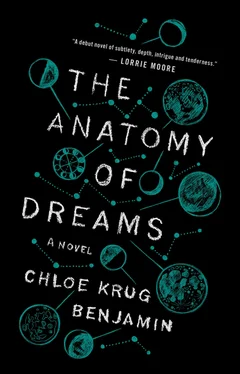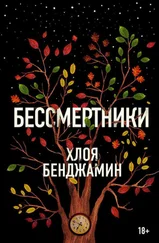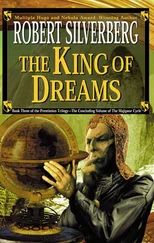I wouldn’t have noticed it if it weren’t so much farther out than everyone else. The first ten feet of water were filled with children and parents. After that, there were teenagers playing catch, a few loners doing laps. But no one was as far as the person my camera had focused on, a man with the elegant, compact musculature of a dolphin.
His body was familiar to me, even from so far away. I had only seen him swim once, when we signed out from Mills to go to the pool at Michael Fritz’s house. Gabe and I had been dating for a month by then, and I was thrilled by the way he tunneled through the water and somersaulted off of the diving board. It was as if he’d grown up not in Tracy, but in San Diego. Diana Gonzalez’s parents lived there, and she claimed she could walk to the beach from her house.
“Where’d you learn to swim?” I asked when he came to sit beside me under the shade of the porch. I leaned over and kissed him stickily, my mouth wet with watermelon and the punch Mike’s mom had made.
“My dad lives in Florida,” Gabe had said, shaking his head with the vigor of a wet dog. Little droplets sprayed my cheek. He nuzzled me, kissed me again, and when he came up, there was a small black teardrop on his tongue. “Seed.”
I tried to follow the man’s progress in the water, but I kept losing him. For stretches of time that felt impossibly long, I couldn’t see anything. Then he burst out of the water in a different part of the ocean, twenty feet away from the view of my camera.
In my first psychology class at UC-Berkeley, I learned that an acute stress response triggers over fourteen hundred changes in the body. Blood flow is increased by 300 percent and directed toward the muscles. Stores of fat and sugar are released. Our pupils dilate, our hearing becomes sharper, and normal processes of the body, like digestion, turn off, no longer important. I stood staked to the ground behind the camera for what felt like minutes, though it could only have been a few seconds. Part of me wanted to jump into the water and leave the camera behind, but I knew I couldn’t do that—it belonged to the school and was worth thousands of dollars. So I lifted the tripod and lugged it across the beach as quickly as I could manage.
“Nothing interesting?” asked David. He was lying flat on his back, limbs spread like a starfish. He held one arm over his eyes like a visor.
“David.” I was already sweating. “I need you to watch the camera for me. I saw someone in the water.”
“Someone in the water?” He sat up. “Did they need help?”
“No, no,” I said. David had been a lifeguard in high school. “It was someone familiar. I have to go. I just need you to watch—”
“Was it the person from last night?” He was staring at me intently, his voice a conspiratorial whisper. “The man in the neighborhood—it’s him, isn’t it?”
I was so flustered that it must have been an easy guess.
“Let me go,” David said. “You’re a terrible swimmer, Sylvie. You’ll never catch him. Point him out to me.”
He was right—I couldn’t swim more than a few yards, and even with the benefits of adrenaline, I doubted I could make it much farther. I wanted to be the one to find Gabe, but David had a better chance of bringing him to shore.
“We’re going to run out of time,” said David, scrambling to his feet. His chest was pale and narrow, the sternum concave. Between his nipples was a dark burst of chest hair the size of a small sunflower. “Just point him out to me, will you?”
I pointed to the man. He was still farther than all of the others, swimming surely to the left. David followed my hand, breathing quickly. Then he set off for the shore at a run. I watched him splash into the shallow water and awkwardly navigate the narrow channels between children. Once he passed them, he broke into a quick, smooth freestyle. Gabe, or the man who looked like him, turned his head every so often as he traveled west, though I couldn’t tell whether he was looking at David or trying to breathe.
David was only ten or twenty feet away when he paused and punched the water’s surface. I didn’t know why until I saw a fleet of sailboats making their way toward him—college students, probably, who could rent boats after taking a quick licensing course. The boats were set to cut right between David and the other man, who was swimming closer to the horizon with increasing speed. David tried to speed up, too—I had zoomed in with my camera and could see the water flurrying behind him—but it was no use; he had to tread water to let the line of boats pass, and when they had, the other man was gone.
Not gone , of course. No longer visible. He couldn’t have disappeared, because this time, I wasn’t the only one who’d seen him. David had, too, and this was so validating that by the time he returned, his chest heaving, I almost felt calm.
6. MADISON, WISCONSIN, 2004
By October, the air had cooled in Madison, and the trees made quilts of red and brown and gold. On a Thursday afternoon, returning home from a trip to the market, I saw Gabe and Janna kneeling in a patch of dirt in our backyard. They were scooping earth into a large clay pot and packing it down, Gabe gathering large fistfuls, Janna pressing down with precise and expert speed.
I stepped onto the back porch and set my bags down. The milk, sweating, leaned against my leg.
“’Lo,” said Janna. “I’m teaching your husband how to grow a dogwood tree.”
She smiled in her brief, catlike way before returning to the mound—a flash of a smile, fool’s gold in a pan.
“Boyfriend,” said Gabe. He looked up at me and grinned.
“That’s right.” Janna slapped at a mosquito that had landed quietly on her arm. “I forget.”
“I thought it would be nice for us to have a little flora around here,” said Gabe, still squatting. “A little fauna. What say you”—he raised himself, propping his elbows on his knees—“about that?”
“ Fauna means ‘animals,’” I said.
“Right,” said Gabe. “But with flora comes fauna. Spiders and dragonflies and ladybugs.”
“You don’t like spiders,” I said. “And have you ever seen a swarm of ladybugs?”
“It’s grotesque,” said Janna cheerfully.
“Anyway,” I said, “isn’t it a bit late to be planting trees? Doesn’t that happen in summer?”
“That’s what I thought. But it turns out,” said Gabe, “that autumn is the perfect time for planting.”
“It isn’t the only time, but it’s really ideal,” Janna said. “After a few frosts, you’ve still got soils that are warm enough through the winter to allow for root growth. Then, when spring comes, the roots are dying for water, and they’re much easier to transplant.”
Janna stood and wiped her hands on her jean shorts, which sagged around her waist. She’d rolled the legs up to the top of her thighs.
“So they can keep growing,” she said.
I thought of the bags at my feet—the twelve eggs, the avocados Gabe liked to eat plain with a spoon. He scarfed them with such boyish enthusiasm that finding the best ones was a secret pleasure of mine. I could spend ten minutes in the produce section, gently prodding their leathery skins.
“I have to put these away,” I said.
“But it’s so glorious out.” Janna stretched her arms, slender but packed with stringy little muscles. “You don’t want to join us?”
“Maybe afterward.”
“Suit yourself,” said Gabe.
I was irritated by the Labrador look of his face, his smile hanging open.
“You’ll be ready to leave in a half hour?” I asked.
“Course,” he said. “I’m never late.”
It was true: Gabe was a stickler when it came to timing. That night, he was in the car fifteen minutes early, his bag packed with lab work and the dinner he carried in separate Tupperware containers—one for cooked pasta, one for cold sauce, one for salad leaves, one for dressing. His packing process was by now so rote, so obsessively standardized, that it almost seemed like an act of resistance rather than submission.
Читать дальше












